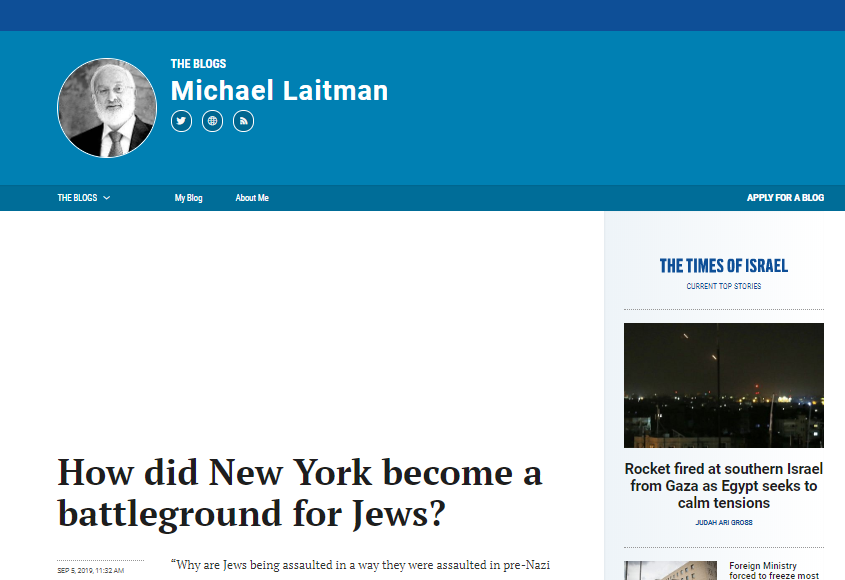
“Why are Jews being assaulted in a way they were assaulted in pre-Nazi Germany,” asks former NY State Assemblyman, Dov Hiking in a heartfelt tweet to NYC Mayor, Bill de Blasio, urging him to address the “out of control anti-Semitism in NY.” He added, “enough is enough.” In fact, three extremely violent attacks on Orthodox men in Brooklyn in less than a week speaks volumes about a vicious pattern of hate crimes being tracked by the police: 145 cases this year—mostly anti-Semitic incidents—nearly double the number reported in 2018. This demands an urgent address, and first of all by us, Jews. What do haters want from us? Are we really willing to accept this as the new norm? We are going to need some strong glue to make our fractured Jewish collective whole again, not only to prevail over the hatred, but even in order to survive.
The victims of this vicious spike in hate crimes have been people easily identifiable as Jews living in traditional Jewish neighborhoods, but history has shown us that hatred does not distinguish between religious denominations or residential areas. Jews around the world are being targeted and attacked only because they are Jews, so no one should feel exempt. Therefore, we must respond as one unified people.
So why is it that this alarming situation is no big deal to many Jews then? When an attack on one isn’t felt as an attack on all, it exemplifies how deeply divided we are as a Jewish people. The lack of empathy and identification as one people is the cause of hatred against us. Our dissociated separation weakens our very foundation as a people, making us easy prey.
In the most recent attack against Jews in New York, a Hasidic man was beaten in the face with a belt in front of a synagogue in Brooklyn. Authorities are also investigating two other similar cases in the last few days. In Crown Heights, according to the NYPD, an assailant bashed a rabbi in the face with a heavy paving stone, breaking his nose and knocking out some teeth. In another incident in the same neighborhood, an Orthodox Jewish man suffered an eye injury after being attacked with ice by a group of aggressors.
If we consider that typically only a small percentage of crimes are ever reported, yet those already counted reveal a startling increase in the numbers of hate crimes. In other words, this is just the tip of the iceberg. Many in the Jewish community have stopped referring to these as “random cases,” now referring to them as “mainstream anti-Semitism.” Just how much Jewish blood must be spilled before we react?
What Do Haters Want from Us?
Throughout history, the hatred of the nations toward the Jews has risen and has fallen. Therefore, many have researched the phenomenon of anti-Semitism, although no one has identified its fundamental cause and how to eliminate it. And its quick intensification today once again testifies to the fact that the antidote to anti-Semitism is still not being applied.
Only the wisdom of Kabbalah explains the core reason for anti-Semitism and its fluctuation throughout history. Kabbalah states that curbing anti-Semitic sentiments is solely dependent upon the Jewish people: To the extent that the Jews come closer to their spiritual root—as a united people (under the dictum “love your friend as yourself”) who radiate a shining example of unity to the world (as “a light unto nations”)—anti-Semitism lessens. This is true because when Jews become unified as one, a magnetic positive field is created covering the entire world. Conversely, the more distant Jews become from their root, anti-Semitism rises, forcing us to unite through the mounting pressure of anti-Semitism—ranging from frequent violent attacks to extreme existential threats like was seen in pogroms and the Holocaust.
The Glue That Binds Us Together Against Anti-Semitism
At this point, you might be asking: how we can possibly reverse our current separation and repulsion since it’s known that we are intrinsically the most opinionated of all people? There is a popular saying: “two Jews, three opinions.” Aware of our nature as a people, from the beginning our sages already established the method to deal with the challenge of rising above our inevitable disagreements.
The book Likutey Etzot (Assorted Counsels) specifies how we should relate to those with whom we disagree:
“The essence of peace is to connect two opposites. Hence, do not be alarmed if you see a person whose view is the complete opposite of yours and you think that you will never be able to make peace with him. Also, when you see two people who are completely opposite to one another, do not say that it is impossible to make peace between them. On the contrary, the essence of peace is to try to make peaceabove two opposites.”
Indeed, only if we contribute our uniqueness to humanity, will our unity grow and our sense of confidence and happiness increase. Our lives are meaningful only when we contribute to society. With this mindset of uniting above our differences and in order to contribute our skills to the creation of a vibrant humanity from which all profit, everyone will find fulfillment and purpose in their lives and in all their actions. This is the juncture at which aggressions will cease and balance will be reestablished in society.
Featured in The Times of Israel